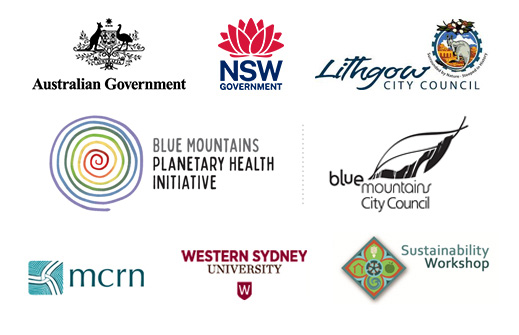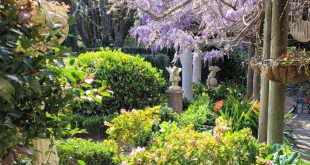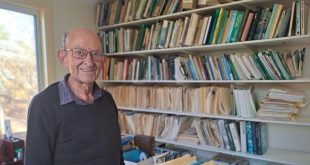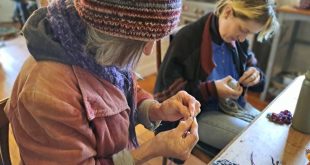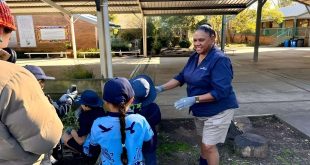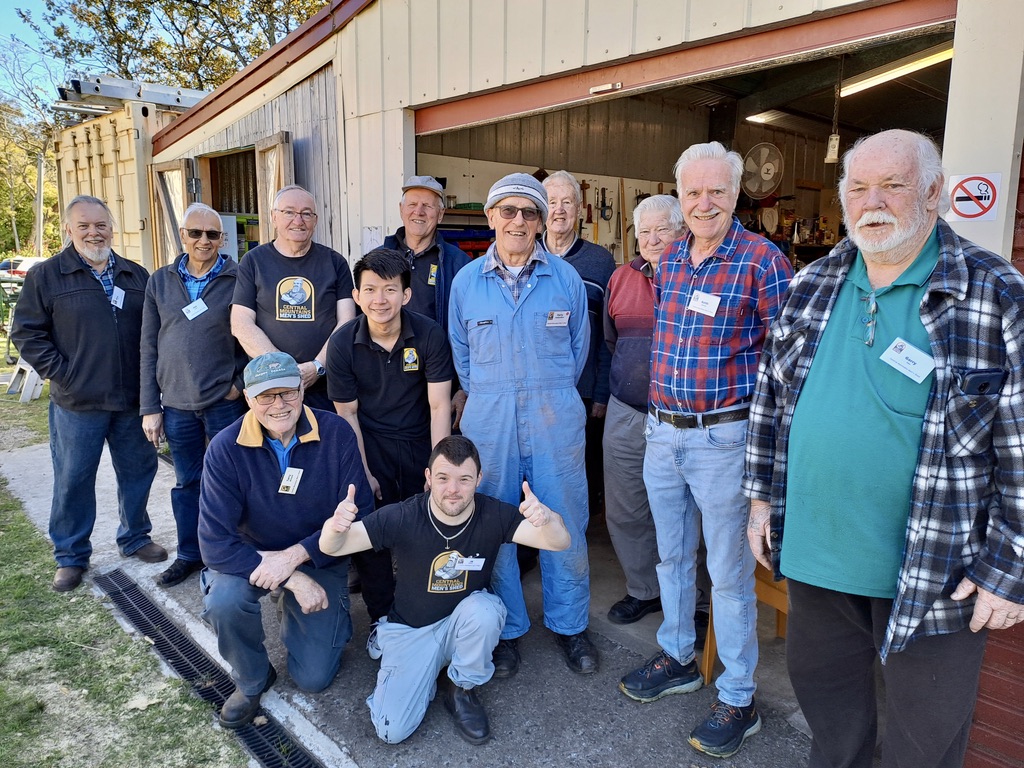
A handful of members at the Central Mountains Men’s Shed in Lawson
Story and photographs by Belle Butler
Something I have discovered while writing for the Planetary Health Initiative is that I embark on every story with preconceptions that are inevitably challenged or up-staged as the story unfolds. In the case of this piece, I had a notion that, being a woman, I would feel like an imposition walking into a Men’s Shed. I thought that the men might think of me as an intrusion on their typical day, that they might grunt some forced acknowledgement of my existence before turning away and continuing with their work.
This preconception could not be further from the truth. I visited the Men’s Shed at Kihilla on Queens Road in Lawson on two occasions. Both were crisp winter days where the meagre warmth of the sun was made up for by the generous welcome of the men at the Shed. They happily put down their tools to chat with me, and when they resumed their work, broad grins and banter flowed between them. Two things stood out to me immediately: here were a group of men who gained skills, fulfilment and pride from their work at the Shed, and here were a group of men with strong bonds and friendship.
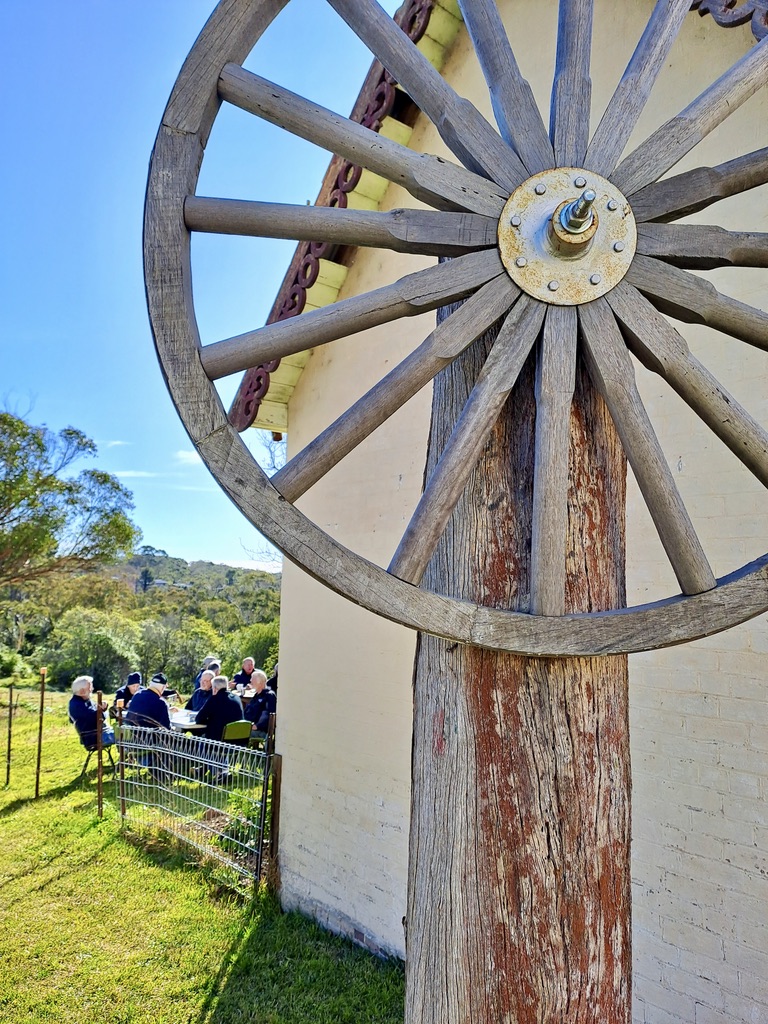
Signature wagon wheel the men built to signpost people to the Shed
Like the original Men’s Shed, the Lawson branch was created with the intention of improving the wellbeing of older men. It started as a small coffee and chat group that met monthly at the Pie Shop in Wentworth Falls. A handful of men of different backgrounds, beliefs and needs grew into a dozen, and then more, with the value of their monthly meet-up expanding proportionately. “I found myself quite looking forward to it,” said Secretary John Crichton, who fondly recalls getting to know these men, including one who used a wheelchair and came along with the assistance of another man: “And here we all were shifting tables around to make space for him and having a great laugh.”
Towards the end of 2017, the growing group felt there might be a need for a Men’s Shed. They put the word out in the Gazette and hosted a meeting at Kihilla Christian Centre. By early 2018 they had 33 members and a mutually beneficial agreement with Kihilla. The men would provide labour around the grounds in exchange for rent-free premises.
Today the Men’s Shed in Lawson has 40 members, some of whom challenged another preconception of mine: the idea that the group’s demographic was restricted to older, retired men. This is a presumption shared by others, including 32 year old Heri Lim, who told me that when he relocated to the Blue Mountains and spotted the group on Facebook, he was advised it was mostly for “retired people who want to do something more in their lives, not get bored, and keep socially active.”
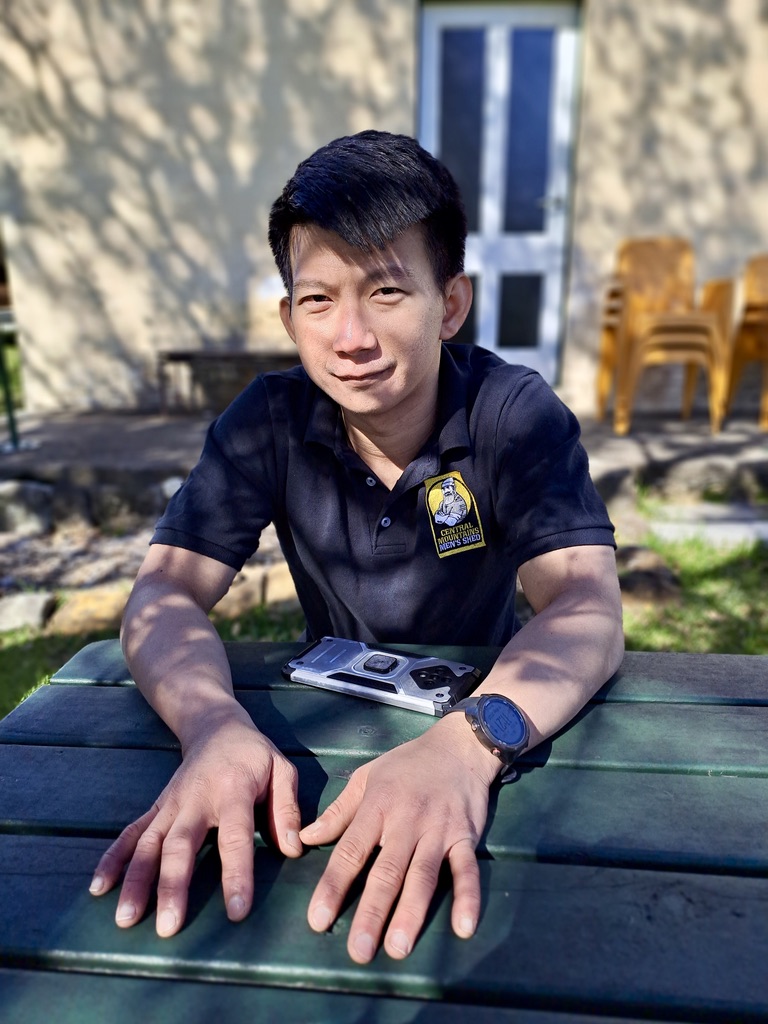
Heri Lim calls the Men’s Shed a ‘gold mine’ for learning new skills
When he disregarded that advice and turned up on a Tuesday to investigate for himself, he was struck by the wealth of untapped knowledge he had landed upon. “I saw that some of them were very good at welding, some of them were very good at woodworking, and I said, ‘Oh, this is a gold mine, there is a lot of skill in here that I can learn.’”
Another younger member, Graham Menzies, expressed a similar sentiment. He was making a stunning cheeseboard when I interrupted him. “A lot of skills are getting lost,” he said. He described the mutually beneficial arrangement by which the younger or un-practiced members gain practical skills to better help them tackle the future, while providing the older members an opportunity to mentor and share their knowledge. “They’re really nurturing, and take you under their wings, and it gives them a sense of purpose and fulfilment,” he said.
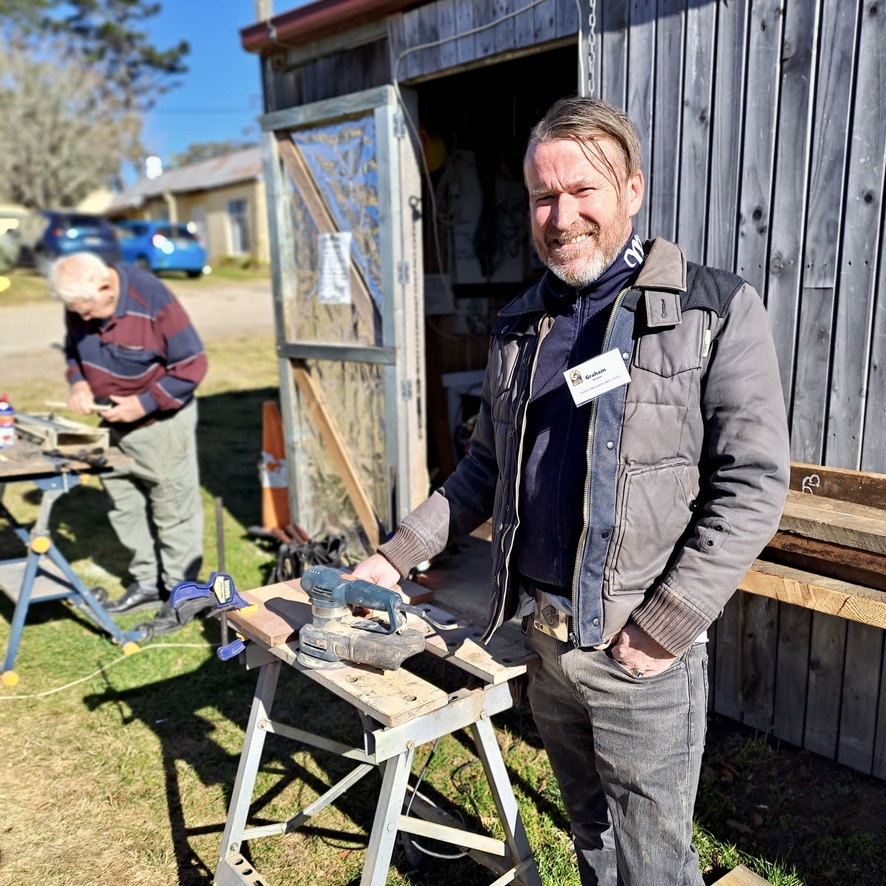
Graham Menzies has enjoyed learning to make cheeseboards
For Heri, sharing knowledge has extended beyond the boundaries of the Shed. While studying to work in Community Services, he recognised the value of learning to drive a manual car “in case of emergency.” One of the Men’s Shed members volunteered to give him driving lessons. “It was very slow progress,” said Heri. “I fell a couple of times, but if I want to help the community, I know I’ll have the skill.”
In return, Heri had an opportunity to share his own skills when the group purchased a laser engraver. Having gained experience in operating 3D printers at a robotic club in Indonesia, he was able to transfer the knowledge to set up and operate the new machine. “One of my placements for my study is that I have to do a project for the community. So, I’m able to help with the engraver as part of volunteer work. I’m making a manual for everyone to be able to use it.”
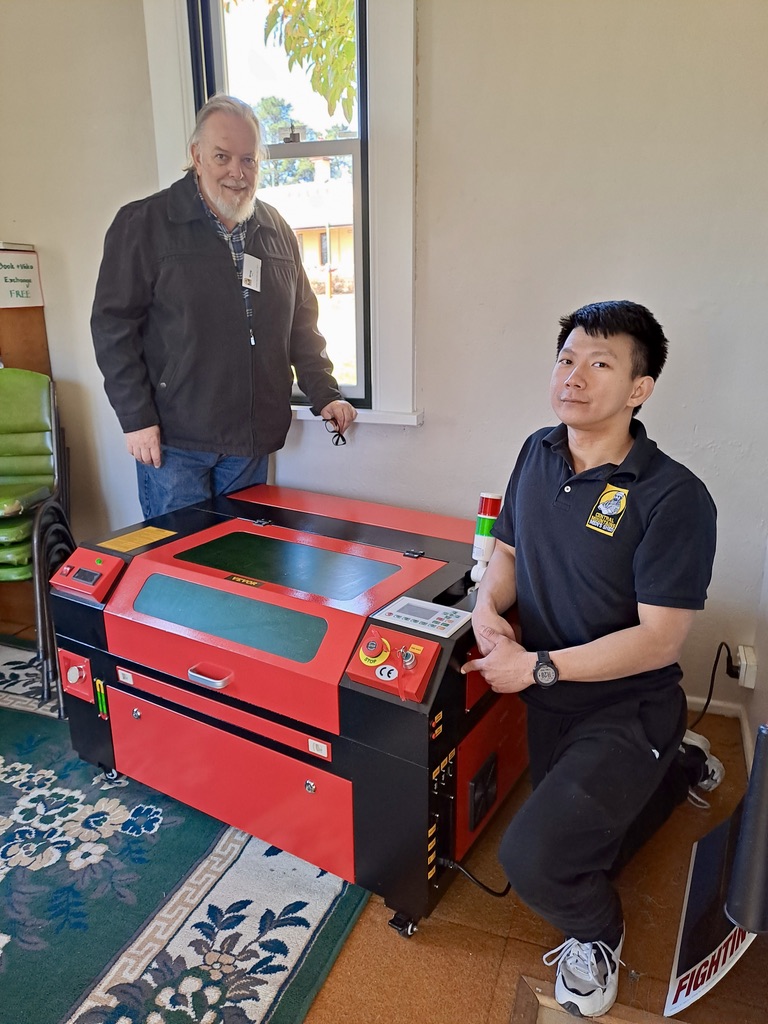
Heri and Geoff at the new laser engraver
Sharing these skills and resources is not reserved for men only. Women visit the Shed on Wednesdays to learn how to use the machines and work on individual or community projects like building bee and nest boxes. Sherlie McMillan, who wanted to do woodwork as a girl but was discouraged because of her gender, values this opportunity to help other women gain confidence and self-sufficiency with these practical skills. Women discuss what they would like to learn, whether it is for personal interest, community projects or house maintenance, and they work on it as a group. Men from the Shed are there as a support if needed. “The men have never been condescending to the women,” Sherlie said. “Some have said they prefer teaching the women because they listen.” She laughed.
Sherlie credited Shed Manager Jim Watson of the Central Mountains Men’s Shed as a real support. “He comes in every Wednesday. He does his own projects but he’s always there if we have any questions.”
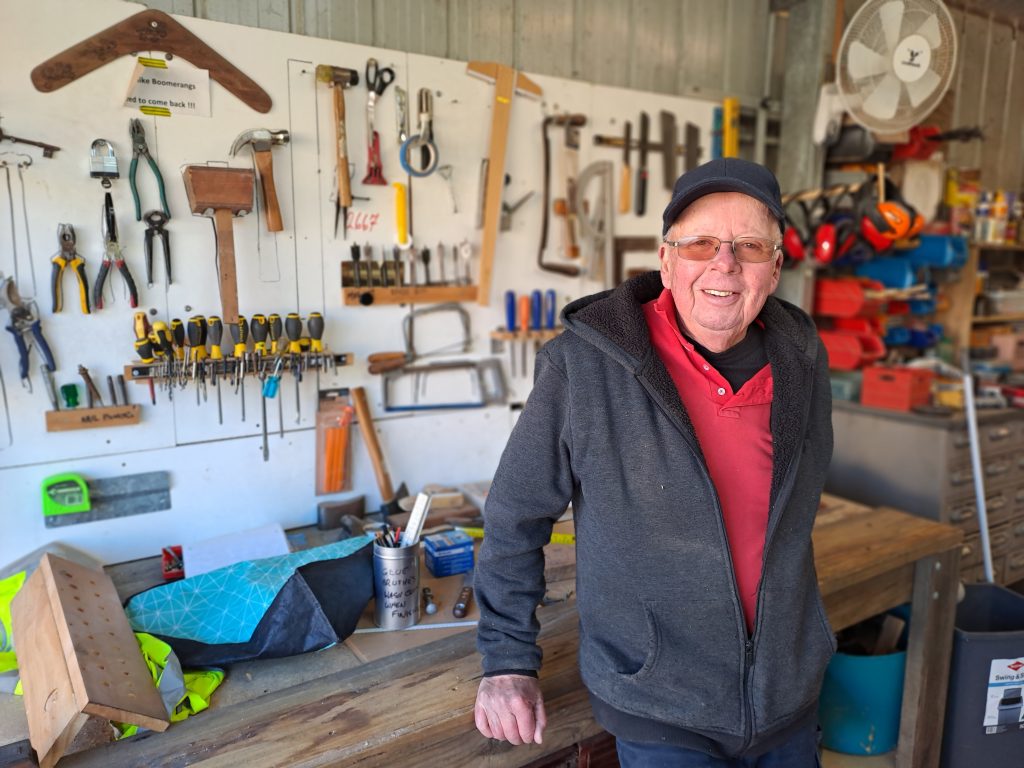
Shed Manager Jim Watson
Jim took me through the shed and explained that most people don’t have room in their homes for such a collection of tools. Indeed, many members cited the shared space as a key aspect of their continued involvement. Not only do they have access to shared equipment, but also companionship while they work. The social aspect of the Men’s Shed cannot be overstated. All members who spoke to me mentioned the supreme value of connecting with others when they visited the Shed. Some of them engage in light banter, others dive deeper into their troubles and are supported by the group. “I also really love the humour,” said John. “It’s a very casual approach some of them take to talking about challenging things that are happening in their lives.” Graham mentioned that morning tea usually takes longer than the work, and that it was great for mental health.
Shed Manager Jim pointed out to me that most of the wood they use is recycled. “Stuff we pick up from the side of the road,” he said. “People throw out beds and desks with beautiful old oak timber we can use.” The wood is stacked in a corner of the shed and repurposed for personal or community needs instead of going into landfill, where wood takes up an estimated 13% of total material. “We’ve built street libraries for the area, and 25 possum boxes for WIRES,” he said.
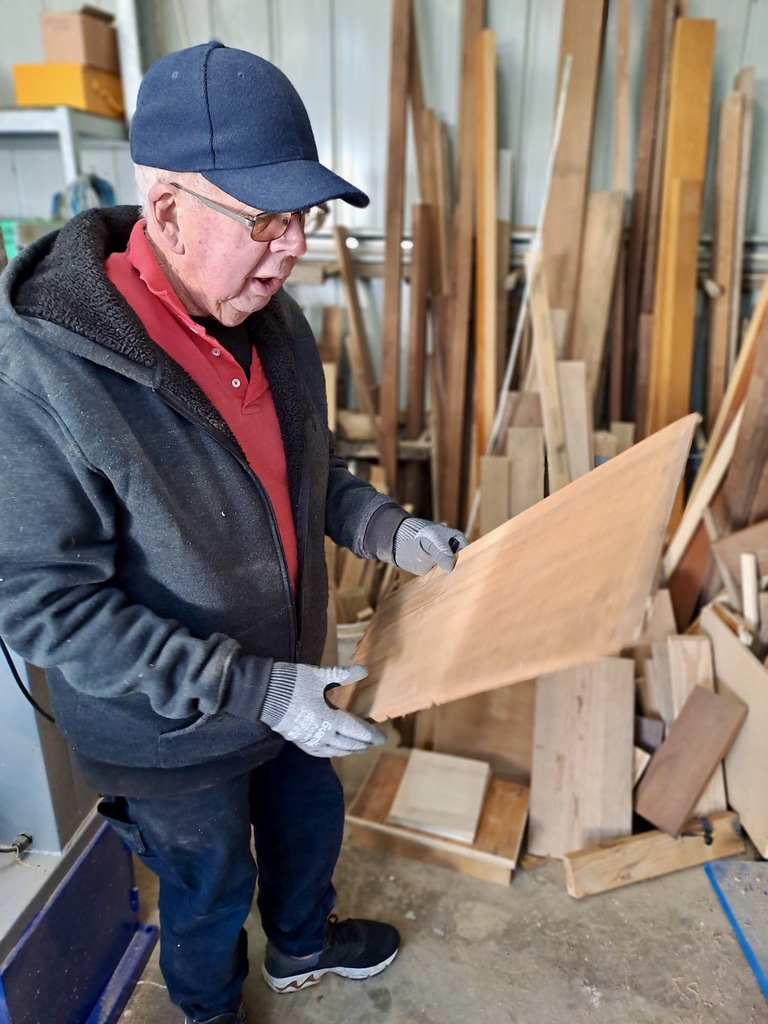
Jim Watson holding a quality piece of recycled oak from a discarded desk
Helping the community is a top priority. Members have embarked on projects for individuals in need as well as community groups and organisations. Geoff Skate, the oldest member at 91, has made a life of volunteering to help others during disaster events and continues to gain fulfilment by contributing to Men’s Shed projects for the local community. “It’s very rewarding in here and here,” he said, pointing to his head and his heart. “You can’t put a dollar value on the look on someone’s face that you’ve helped.” Passing on his skills to others in the Men’s Shed, Geoff helps to equip a community that is better able to support each other into the future.
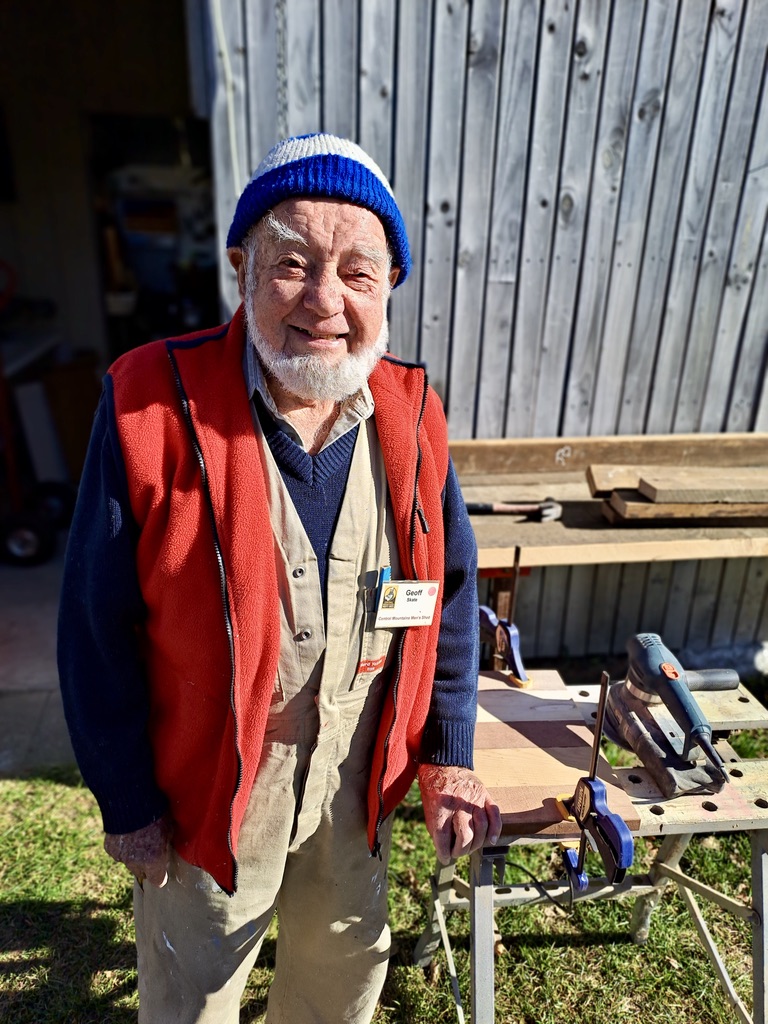
91 year old Geoff Skate told me – I get bored if I’m not producing
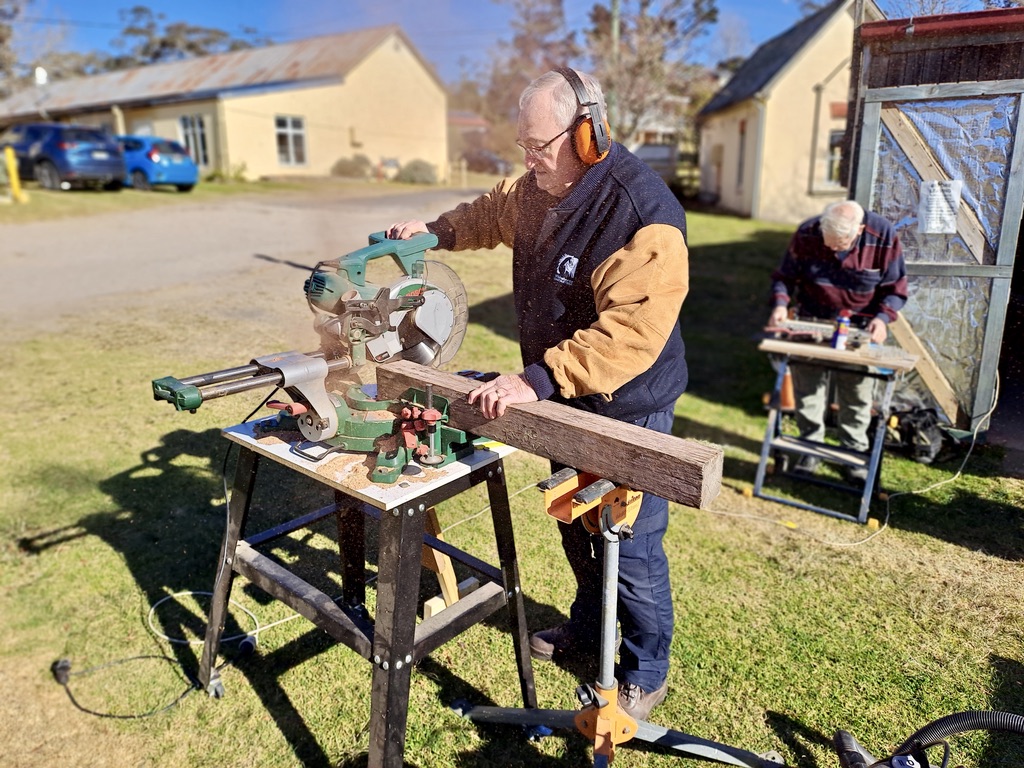
Mens Shed Treasurer Paul Friend squaring up legs for a picnic table.
When I left the Men’s Shed, members were gathered on picnic tables enjoying cakes and tea. They invited me to join, but unfortunately, I had to get home. I took a photo instead and joked that I’d expose them all for what they really spent their time doing at the Shed. Their laughter was hearty, but the truth is, their tea break is just as valuable as their hard work. The Men’s Shed is not just a place for older men to tinker. It is a place for anyone in the community to gain and share skills, give back to others, grow community- and self-sufficiency, build confidence and have a good laugh.
As Heri said, “This is a not-for-profit organisation that helps community. I encourage everyone to go there and keep the group active.”
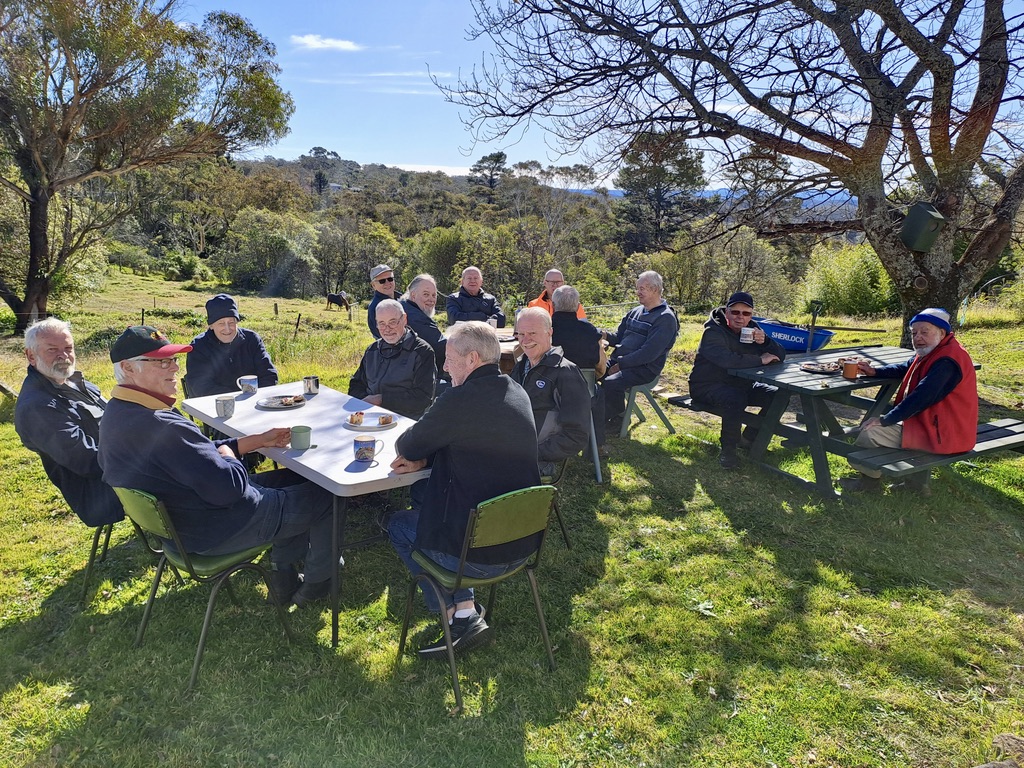
Morning tea time at the Men’s Shed
If you would like advice or help with a project, of if you’d like to become a member, you can drop into the Men’s Shed Tuesday-Thursday or contact John Crichton: 0425 271 029
Their Facebook page can be visited here: Central Mountains Men’s Shed
This story has been produced as part of a Bioregional Collaboration for Planetary Health and is supported by the Disaster Risk Reduction Fund (DRRF). The DRRF is jointly funded by the Australian and New South Wales governments.
